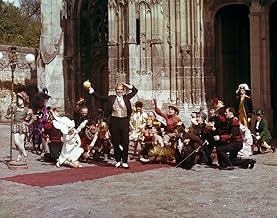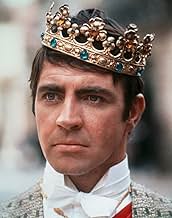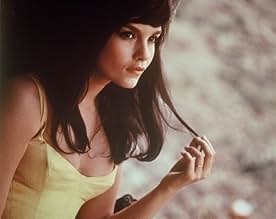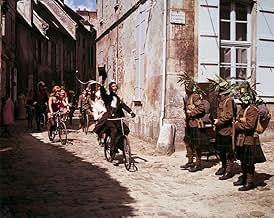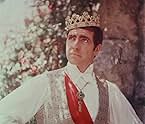ÉVALUATION IMDb
7,3/10
4,6 k
MA NOTE
Ajouter une intrigue dans votre langueDuring World War I, a British private, sent ahead to a French town to scout for enemy presence, is mistaken for a King by the colorful patients of an insane asylum.During World War I, a British private, sent ahead to a French town to scout for enemy presence, is mistaken for a King by the colorful patients of an insane asylum.During World War I, a British private, sent ahead to a French town to scout for enemy presence, is mistaken for a King by the colorful patients of an insane asylum.
- Director
- Writers
- Stars
Pier Paolo Capponi
- Un Officier Anglais
- (as Paolo Capponi)
Georges Adet
- L'aliéné-docteur
- (uncredited)
Jackie Blanchot
- Le Gabalou
- (uncredited)
Robert Blome
- Un aliéné
- (uncredited)
Jean-Marie Bon
- Un aliéné
- (uncredited)
Avis en vedette
De Broca's delightful and surreal anti-war fantasy quickly attained a cult status when it was first released, but in recent years it has dropped more and more out of sight. A shame, because it is a charming film, the whimsical, romantic nature of which is entirely French. Even though the underlying message, that of preferring one kind of insanity to another is a simple, absurdist one, the viewer is still carried along by the Gaullic charm of it all.
As the much-put-upon martial ornithologist, It's not just because Bates is the only English member of the cast that one is aware of some awkwardness in his casting. For English cinema goers in particular, familiar with his career, his usual jocular masculinity is hard to reconcile with an child-like character, swept along by events. Those who remember Bates and Oliver Reed wrestling nude in 'Women in Love' (1962) from the same period, or his cocky Vic in 'A Kind of Loving' (1962), may bulk at Bates portraying such a confused innocent. Having said that, Bates' actual performance is balanced and restrained, all of a piece with the rest of the cast.
'King of Hearts' is primarily an ensemble piece. Many of the film's most delightful moments spring from the fancy-filled and flirtatious lunatics who quickly fill the streets, shops and occupations left by the fleeing villagers, their interaction with each other, and Plumpick. This world of fantasy is curtailed by the village walls, which physically as well as mentally encircle their environment. Outside is reality (no matter how ludicrously it is presented), conflict, death. Inside the walls is harmony of sorts, life celebrated. This distinction between outside and inside is made clear in the film. As soon as Plumpick attempts to ride a horse back into the real world for help, the music and the mass accompaniment of him by the inmates has to end until he is obliged to return.
As the 'King of Hearts' Plumpick is at the center of his motley 'people', as well as of Coquelicot's (Geneviève Bujold) affections. Once he awards himself his name, in a panic and on the run, his 'subjects' call out for him. He is promptly 'crowned' (both by banging his head, inducing his initial confusion, and though acquiring his 'kingship'). He is awarded a bride, and accepted as an unique traveller into the society of the amiably mad. Their acceptance of him anticipates the final scene of the film, when a chastened Plumpick re-admits himself into their company, having rejected the larger insanity of warfare.
It's fitting in a way that the least successful parts of the film lay outside of the village, where comic stereotypes replace whimsy and the comedy is drawn with much broader strokes. In particular Colonel MacBibenbrook (Adolfo Celi, better known as Emil Largo in 'Thunderball') is uncomfortably close to parody, and his part would have been much better cast with an actor like Trevor Howard who could excel with a line in ironic bombast. The Germans fare no better and, although amusing and lightweight in their capers, one misses the delicacy with which the lunatics are portrayed. One suspects that De Broca associates more with the geniality of the insane, as we all do given the options, and this sympathy is reflected on screen
Tellingly, the lunatics are not completely oblivious to the hostile world which surrounds them, although they are content to ignore the immediate threat of destruction and Plumpick's warnings. At the end of the film, once the opposing forces have symbolically destroyed themselves, Marcel says:'I'm tired of this game, let's go back to our rooms'. With deliberate sadness, they divest themselves of their play robes and return to their asylum, a divestment scene at the same time quiet, serious and eminently sane. It is clear that they are mad - but not crazy.
As the much-put-upon martial ornithologist, It's not just because Bates is the only English member of the cast that one is aware of some awkwardness in his casting. For English cinema goers in particular, familiar with his career, his usual jocular masculinity is hard to reconcile with an child-like character, swept along by events. Those who remember Bates and Oliver Reed wrestling nude in 'Women in Love' (1962) from the same period, or his cocky Vic in 'A Kind of Loving' (1962), may bulk at Bates portraying such a confused innocent. Having said that, Bates' actual performance is balanced and restrained, all of a piece with the rest of the cast.
'King of Hearts' is primarily an ensemble piece. Many of the film's most delightful moments spring from the fancy-filled and flirtatious lunatics who quickly fill the streets, shops and occupations left by the fleeing villagers, their interaction with each other, and Plumpick. This world of fantasy is curtailed by the village walls, which physically as well as mentally encircle their environment. Outside is reality (no matter how ludicrously it is presented), conflict, death. Inside the walls is harmony of sorts, life celebrated. This distinction between outside and inside is made clear in the film. As soon as Plumpick attempts to ride a horse back into the real world for help, the music and the mass accompaniment of him by the inmates has to end until he is obliged to return.
As the 'King of Hearts' Plumpick is at the center of his motley 'people', as well as of Coquelicot's (Geneviève Bujold) affections. Once he awards himself his name, in a panic and on the run, his 'subjects' call out for him. He is promptly 'crowned' (both by banging his head, inducing his initial confusion, and though acquiring his 'kingship'). He is awarded a bride, and accepted as an unique traveller into the society of the amiably mad. Their acceptance of him anticipates the final scene of the film, when a chastened Plumpick re-admits himself into their company, having rejected the larger insanity of warfare.
It's fitting in a way that the least successful parts of the film lay outside of the village, where comic stereotypes replace whimsy and the comedy is drawn with much broader strokes. In particular Colonel MacBibenbrook (Adolfo Celi, better known as Emil Largo in 'Thunderball') is uncomfortably close to parody, and his part would have been much better cast with an actor like Trevor Howard who could excel with a line in ironic bombast. The Germans fare no better and, although amusing and lightweight in their capers, one misses the delicacy with which the lunatics are portrayed. One suspects that De Broca associates more with the geniality of the insane, as we all do given the options, and this sympathy is reflected on screen
Tellingly, the lunatics are not completely oblivious to the hostile world which surrounds them, although they are content to ignore the immediate threat of destruction and Plumpick's warnings. At the end of the film, once the opposing forces have symbolically destroyed themselves, Marcel says:'I'm tired of this game, let's go back to our rooms'. With deliberate sadness, they divest themselves of their play robes and return to their asylum, a divestment scene at the same time quiet, serious and eminently sane. It is clear that they are mad - but not crazy.
It's World War I, and a Scottish Private named Plumpick (Alan Bates) is ordered to infiltrate a French village and stop a bomb that the Germans have planted from going off. Upon arriving, Plumpick discovers the entire village deserted, except for the patients of the local insane asylum, who have been left behind. The patients soon escape the asylum, play dress-up with the various clothes they find lying around the village, and take it over. Not only this, but they crown Plumpick their king! With the German army still in the vicinity nearby, Plumpick must find the bomb, diffuse it, and save his "subjects" from certain death....
An all-time foreign film classic, "Le Roi De Coeur," aka "King Of Hearts," is a marvelous movie, full of sweetness, charm, and both clever comedy & fine drama that also comments very well on the stupidity of war. Alan Bates, who sadly passed away recently, is simply wonderful as Private Plumpick, as is the lovely Genevieve Bujold as the young patient named Poppy that Plumpick falls for, and Adolfo Celi is quite funny as Plumpick's stuffy superior officer. The rest of the film's big ensemble cast, whether playing the asylum patients or various soldiers, are all excellent, too.
The only thing that stops "King Of Hearts" from being perfect is that it *could* very well be argued that the insane asylum patients in this movie aren't...well, *insane* enough. They may speak strangely to one another or to Private Plumpick, but, for the most part, they act & behave quite coherently. But other than that, "King Of Hearts" is a very charming foreign film, and one of the very best films of the late, great Alan Bates. Definitely seek this one out.
An all-time foreign film classic, "Le Roi De Coeur," aka "King Of Hearts," is a marvelous movie, full of sweetness, charm, and both clever comedy & fine drama that also comments very well on the stupidity of war. Alan Bates, who sadly passed away recently, is simply wonderful as Private Plumpick, as is the lovely Genevieve Bujold as the young patient named Poppy that Plumpick falls for, and Adolfo Celi is quite funny as Plumpick's stuffy superior officer. The rest of the film's big ensemble cast, whether playing the asylum patients or various soldiers, are all excellent, too.
The only thing that stops "King Of Hearts" from being perfect is that it *could* very well be argued that the insane asylum patients in this movie aren't...well, *insane* enough. They may speak strangely to one another or to Private Plumpick, but, for the most part, they act & behave quite coherently. But other than that, "King Of Hearts" is a very charming foreign film, and one of the very best films of the late, great Alan Bates. Definitely seek this one out.
A charming film, first, for the contained naked truth. Second, for status of reflection in mirror of near reality, in too many senses. Not the last, for acting and the veil of innocence and cold / precise perspective about life, freedom, expectations, fears , joy in pure state. A film deserving to be loved and seen often. As a sort of cure. So, Alan Baits and Genevieve Bujold. And the others. A cold perspective, seeming a kind of verdict, about reality and its large illusions.
One of the biggest cult films of the 60s and 70s* is now back for a brief theatrical run on it's way to Blu Ray and Streaming courtesy of a new 4K Restoration by the Cohen Media Group to commemorate its 50th Anniversary. The restoration looks fine, if not extraordinary (it may look better on Blu-Ray since most theaters will be showing it via 2K DCP).
Reviewing the film for the first time is a bit tricky in light of its formidable cult history. At the time, it's success was often chalked up to as a counter-culture commentary on the insanity of the Vietnam War. By the 80s and 90s, KING got tabbed as 'of its time' and 'dated' (a term I despise).
In 2018? With distance, one can look at it as the timeless fable it always was at its core. A British soldier Plumpick (Alan Bates) is sent to a small German occupied village in WWI on a spy mission. Unbeknownst to the Allied forces, the village has already been evacuated and the Germans have also left (leaving a nasty surprise behind). In a bizarre turn of events, the village's only inhabitants are the patients at an insane asylum. The patients soon dub Plumpick their de facto ruler - 'The King of Hearts'. Not content with just a 'King', the patients dress up and become characters of their own - everything from Dukes and Duchesses, to Prostitutes and Madams. A particularly winsome lass, Coquelicot (Genevieve Bujold) is presented as a possible Queen to the 'King'.
There is much frivolity and preciousness on hand, much of it entertaining, and much of it cloying (and all of it will be found offensive to many people offended at its portrayal of the mentally ill). De Broca's direction and the script by Daniel Boulanger and Maurice Bessy moves in fits and starts. How enjoyable one finds it will depend on one's tolerance for such whimsy. The performances are energetic and its no wonder Bujold (in her yellow tutu) soon became an international name.
The film's message that the insanity of war would be no different with the actual 'insane' in charge (if not better off!) is facile, of course, but, one can see how it would have had resonance during a time of war, protest, assassinations and such. It's like Renoir's RULES OF THE GAME as played by mad fools. But, rather than just saying it's 'dated' and 'of its time' (just as facile, in my book), its better to just look at KING OF HEARTS as fairy-tale for all times. * After not doing much business in its initial run, KING OF HEARTS had a legendary 4 to 5 year run (depending on the source) at the now defunct Central Square Cinemas in Boston. During that period it spread to midnight shows, college campuses and revival houses across the country. It remained in regular revival house distribution into the 80s.
Reviewing the film for the first time is a bit tricky in light of its formidable cult history. At the time, it's success was often chalked up to as a counter-culture commentary on the insanity of the Vietnam War. By the 80s and 90s, KING got tabbed as 'of its time' and 'dated' (a term I despise).
In 2018? With distance, one can look at it as the timeless fable it always was at its core. A British soldier Plumpick (Alan Bates) is sent to a small German occupied village in WWI on a spy mission. Unbeknownst to the Allied forces, the village has already been evacuated and the Germans have also left (leaving a nasty surprise behind). In a bizarre turn of events, the village's only inhabitants are the patients at an insane asylum. The patients soon dub Plumpick their de facto ruler - 'The King of Hearts'. Not content with just a 'King', the patients dress up and become characters of their own - everything from Dukes and Duchesses, to Prostitutes and Madams. A particularly winsome lass, Coquelicot (Genevieve Bujold) is presented as a possible Queen to the 'King'.
There is much frivolity and preciousness on hand, much of it entertaining, and much of it cloying (and all of it will be found offensive to many people offended at its portrayal of the mentally ill). De Broca's direction and the script by Daniel Boulanger and Maurice Bessy moves in fits and starts. How enjoyable one finds it will depend on one's tolerance for such whimsy. The performances are energetic and its no wonder Bujold (in her yellow tutu) soon became an international name.
The film's message that the insanity of war would be no different with the actual 'insane' in charge (if not better off!) is facile, of course, but, one can see how it would have had resonance during a time of war, protest, assassinations and such. It's like Renoir's RULES OF THE GAME as played by mad fools. But, rather than just saying it's 'dated' and 'of its time' (just as facile, in my book), its better to just look at KING OF HEARTS as fairy-tale for all times. * After not doing much business in its initial run, KING OF HEARTS had a legendary 4 to 5 year run (depending on the source) at the now defunct Central Square Cinemas in Boston. During that period it spread to midnight shows, college campuses and revival houses across the country. It remained in regular revival house distribution into the 80s.
A timeless and exquisite treatment of profound and compelling issues, this 1966 International collaboration, was one of the few films ever to give tasteful testimony to being truly sane, or maybe I should say being truly (in)sane in a cruel and berserk world. If you liked Life Is Beautiful, E.T., Star Wars, The Great Dictator, Gandhi, Henry V, Blazing Saddles, or Rain Man... you will probably love this movie. It remains for me among the top three or four, of all movies I have ever seen.
Le saviez-vous
- AnecdotesWhile the film was a flop with critics and audiences in France, it was an unexpected cult success in the USA, running for years in Boston repertory film houses circa 73-76. Midnight showings around the country made it an early cult film, like The Rocky Horror Picture Show (1975), Eraserhead (1977), El Topo (1970), Orgissimo (1970), etc...
- GaffesThe stairs/ladder Plumpick uses to climb to the top of the blockhouse appear out of nowhere.
- Citations
[last lines]
Le Duc de Trèfle: The most beautiful journeys are taken through the window.
- Générique farfeluThe credits rise and then fall to coincide with the sound of a large clock.
- ConnexionsReferenced in Il faut sauver le soldat Ryan (1998)
- Bandes originalesLa Valse Tordue
Written and Performed by Georges Delerue Et Son Orchestre
Meilleurs choix
Connectez-vous pour évaluer et surveiller les recommandations personnalisées
- How long is King of Hearts?Propulsé par Alexa
Détails
- Date de sortie
- Pays d’origine
- Langues
- Aussi connu sous le nom de
- King of Hearts
- Lieux de tournage
- Senlis, Oise, France(insane asylum and town square scenes, Senlis is 55 km north of Paris)
- sociétés de production
- Consultez plus de crédits d'entreprise sur IMDbPro
Box-office
- Brut – États-Unis et Canada
- 17 646 $ US
- Fin de semaine d'ouverture – États-Unis et Canada
- 3 443 $ US
- 25 févr. 2018
- Brut – à l'échelle mondiale
- 18 130 $ US
Contribuer à cette page
Suggérer une modification ou ajouter du contenu manquant


![Trailer [OV]](https://m.media-amazon.com/images/M/MV5BOTgyNWQ0NTctZWY1Mi00NzY1LTljNWItMWFlNjI2MDMzM2NmXkEyXkFqcGdeQXRyYW5zY29kZS13b3JrZmxvdw@@._V1_QL75_UY281_CR79)

